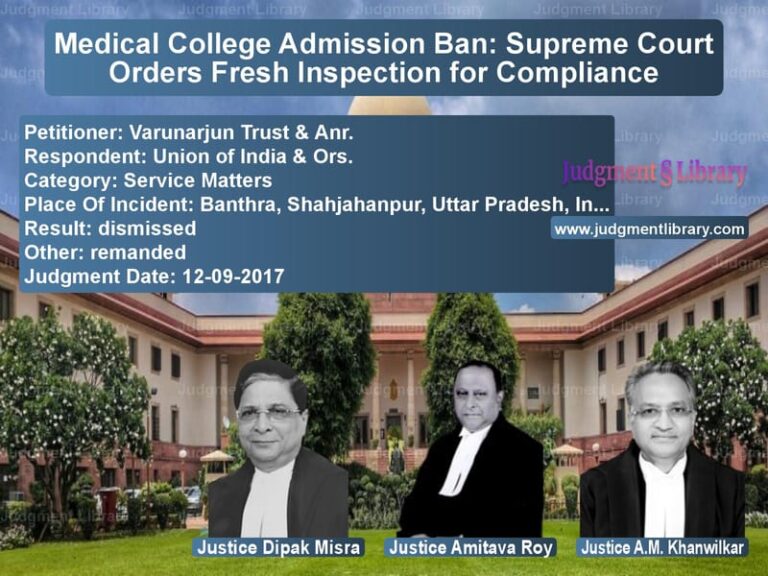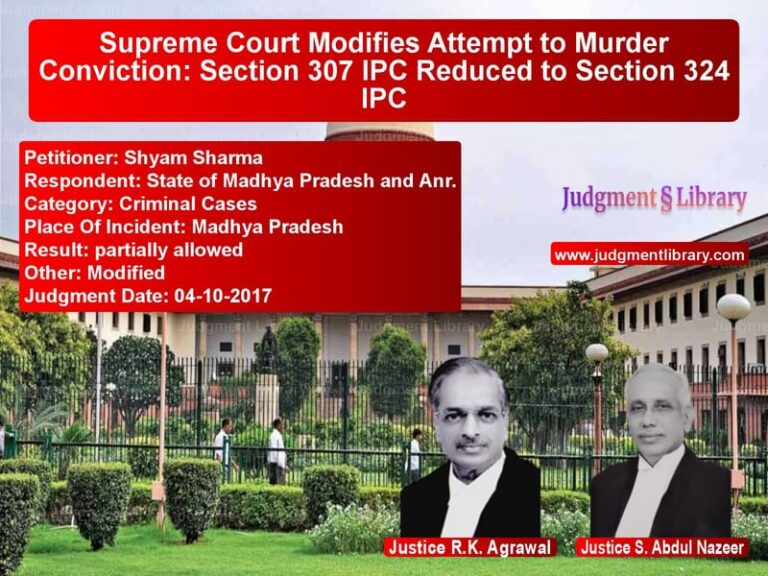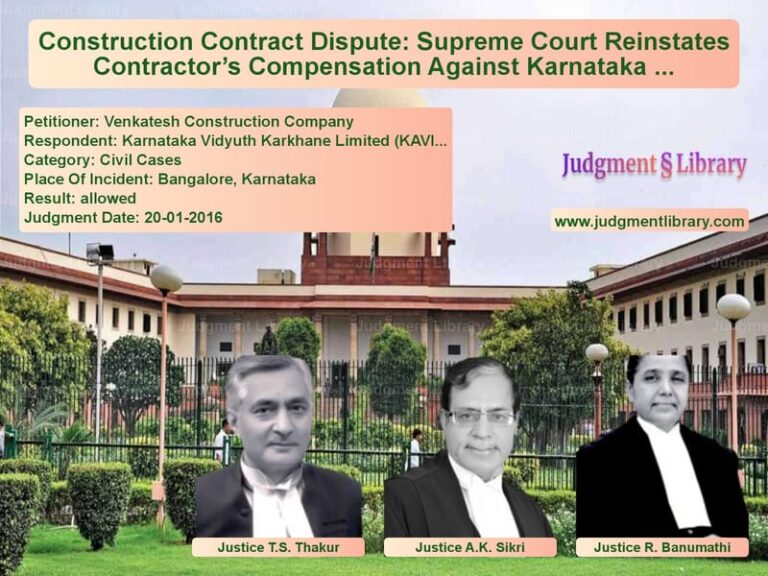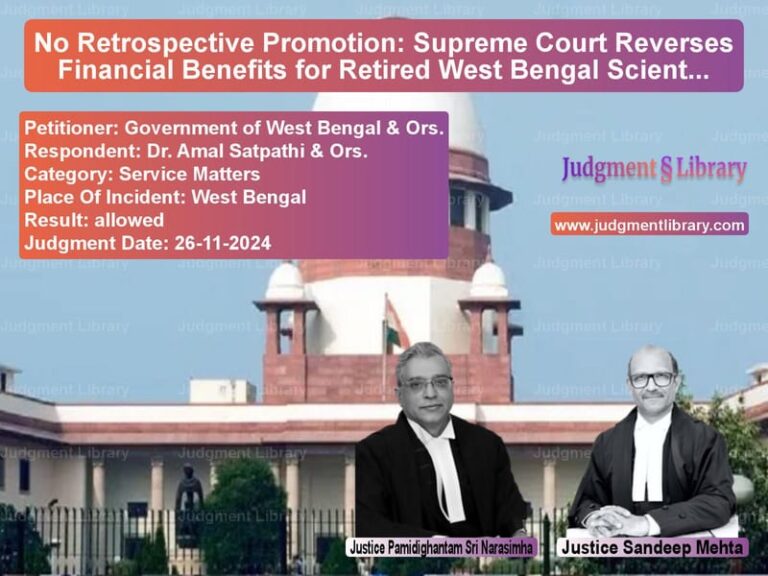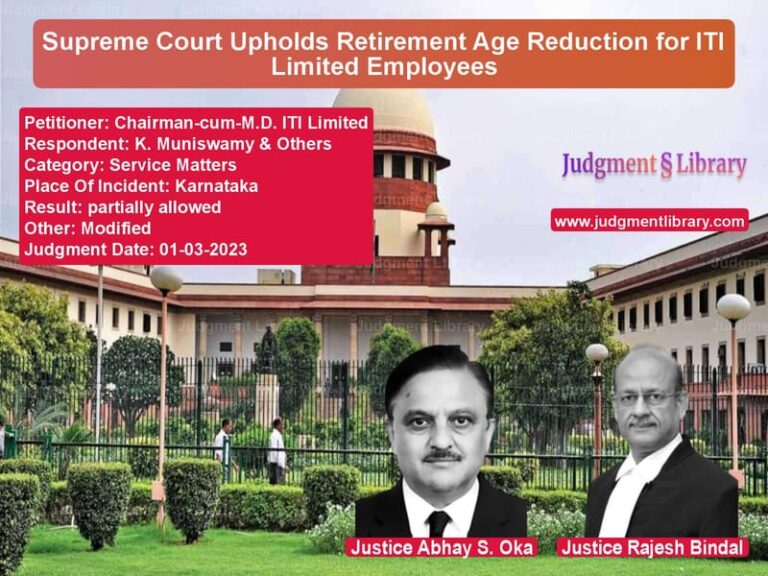Election Petition Against Manipur MLA Dismissed: Supreme Court Upholds High Court Order
The case of Thangjam Arunkumar vs. Yumkham Erabot Singh & Others revolves around a crucial election dispute from the 15-Wangkhei Assembly Constituency in Manipur. The Supreme Court upheld the High Court’s order rejecting the dismissal of the election petition filed by the unsuccessful candidate. The case primarily deals with the procedural requirements under the Representation of the People Act, 1951, particularly regarding allegations of corrupt practices.
Background of the Case
During the elections to the XII Manipur Legislative Assembly, Thangjam Arunkumar was declared the winning candidate from the 15-Wangkhei Assembly Constituency. The losing candidate, Yumkham Erabot Singh, filed an election petition challenging the validity of the election, alleging corrupt practices. The petition was based on provisions under Sections 80, 80A, 81, 84, read with Sections 100(1)(d)(iv) and 101 of the Representation of the People Act, 1951.
The primary contention was that the winning candidate, Arunkumar, had failed to disclose certain financial transactions related to loan financing, which, according to the petitioner, constituted corrupt practices.
Key Legal Issues
The appellant (Arunkumar) filed applications under:
- Order 7 Rule 11 of the Code of Civil Procedure (CPC), seeking dismissal of the election petition on the grounds that it did not disclose a cause of action.
- Section 86 of the Representation of the People Act, arguing that the petition lacked material particulars and failed to meet the legal requirements.
- Non-compliance with Section 83(1)(c) of the Act, which mandates that allegations of corrupt practices be accompanied by an affidavit in the prescribed format.
The High Court rejected the applications, leading to the appeal before the Supreme Court.
Arguments by the Petitioner (Thangjam Arunkumar)
The petitioner presented the following arguments:
- The election petition lacked material facts necessary to constitute a case of corrupt practice.
- The allegations of corrupt practices were vague and did not meet the statutory requirements under Section 83(1)(b) of the Act.
- The petitioner failed to submit an affidavit in Form 25, as required under Rule 94A of the Conduct of Election Rules, 1961.
- Due to these procedural lapses, the election petition should have been dismissed at the threshold.
Arguments by the Respondent (Yumkham Erabot Singh)
The respondent countered the petitioner’s arguments by stating:
- The election petition contained all necessary details to establish corrupt practice.
- Even if there were minor defects in the affidavit, they were curable and did not warrant dismissal of the petition.
- The High Court correctly concluded that there was substantial compliance with the legal requirements.
Key Observations by the Supreme Court
The Supreme Court analyzed the provisions of the Representation of the People Act, 1951, along with relevant case laws and noted:
“The requirement to file an affidavit under the proviso to Section 83(1)(c) is not mandatory. It is sufficient if there is substantial compliance. As the defect is curable, an opportunity may be granted to file the necessary affidavit.”
The Court also referred to previous rulings, such as:
- T.M. Jacob v. C. Poulose (1999) 4 SCC 274: Held that non-compliance with procedural requirements under Section 83 is a curable defect.
- G.M. Siddeshwar v. Prasanna Kumar (2013) 4 SCC 776: Confirmed that an election petition should not be dismissed solely on technical grounds.
- A. Manju v. Prajwal Revanna (2022) 3 SCC 269: Ruled that even if an affidavit in Form 25 was not submitted, the defect could be rectified later.
Based on these precedents, the Court determined that the election petition was valid despite minor procedural lapses.
Final Judgment
The Supreme Court dismissed the appeal, stating:
“For the reasons stated above, we are of the opinion that the Appellant has not made out a case for interfering with the judgment of the High Court.”
The election petition will now proceed to trial before the High Court.
Conclusion
This judgment reinforces that procedural lapses in election petitions should not be used as technical grounds for dismissal. The Supreme Court emphasized the principle of substantial compliance, ensuring that election disputes are decided on merits rather than on mere technicalities. This ruling sets an important precedent for future election petitions in India.
Petitioner Name: Thangjam Arunkumar.Respondent Name: Yumkham Erabot Singh & Others.Judgment By: Justice Dhananjaya Y Chandrachud, Justice Pamidighantam Sri Narasimha.Place Of Incident: Manipur.Judgment Date: 23-08-2023.
Don’t miss out on the full details! Download the complete judgment in PDF format below and gain valuable insights instantly!
Download Judgment: thangjam-arunkumar-vs-yumkham-erabot-singh-supreme-court-of-india-judgment-dated-23-08-2023.pdf
Directly Download Judgment: Directly download this Judgment
See all petitions in Public Interest Litigation
See all petitions in Legislative Powers
See all petitions in Judgment by Dhananjaya Y Chandrachud
See all petitions in Judgment by P.S. Narasimha
See all petitions in dismissed
See all petitions in supreme court of India judgments August 2023
See all petitions in 2023 judgments
See all posts in Election and Political Cases Category
See all allowed petitions in Election and Political Cases Category
See all Dismissed petitions in Election and Political Cases Category
See all partially allowed petitions in Election and Political Cases Category



